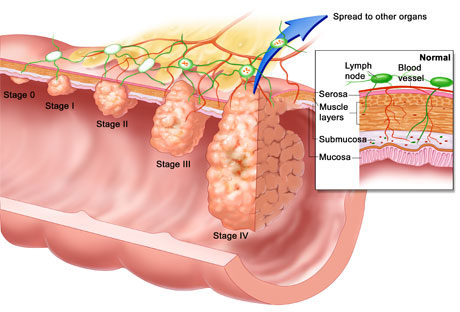Inflammation contributes to colon cancer
Researchers led by Dr. Washington Irinani Dr. Brian Iritani found that Smad3-resistant molecules are very sensitive to bacterial and cancer inflammation.
Bacteria play a small role in shaping some types of cancer by stimulating chronic inflammation. The lack of a molecule that blocks inflammation, Smad3, may increase the risk of colon cancer.
 Colon cancer. ( Photo: gastrocentralva.com )
Colon cancer. ( Photo: gastrocentralva.com )
To test whether Smad3 has a role in developing colon cancer, Maggio-Price and colleagues looked at mice lacking Smad3 and adaptive resistance responses. They found that these mice were very sensitive to bacterial inflammation and cancer due to the lack of T-cell function and the proliferation of inflamed cells. Through the increase of cancer-causing proteins and self-destructive proteins, epithelial cells in the colon tissue improve growth and survival.
Dr. Iritani explains: 'The inflammatory response to microorganisms is a key factor in the results of the important tumor blockers' function for Smad3 in T cells, intestinal epithelial cells, pine. often limits the development of colon cancer when responding to bacterial inflammation '.
Refer:
1. Maggio-Price L, Treuting P, Bielefeldt-Ohmann H, Seamons A, Drivdahl R, Zeng W, Lai LH, Huycke M, Phelps S, Brabb T1, Iritani BM.Lỗi trùngAm J Pathol, 2009, 174: 317-329
- Nuts can prevent colon cancer
- Nuts can help control colon cancer
- Discovered 'culprit' causes colon cancer
- The key to preventing colon cancer attacks the liver
- Extracts from abalone mushroom treat colon cancer
- Mistletoe extract helps treat colon cancer
- Vegetables reduce the risk of colon cancer
- For the first time, a case of terminal cancer is treated
- Soybeans prevent colon cancer
- Vitamin D helps prevent colon cancer
- Two types of proteins help predict colon cancer
- Colonoscopy reduces the risk of cancer by 40%
 Green tea cleans teeth better than mouthwash?
Green tea cleans teeth better than mouthwash? Death kiss: This is why you should not let anyone kiss your baby's lips
Death kiss: This is why you should not let anyone kiss your baby's lips What is salmonellosis?
What is salmonellosis? Caution should be exercised when using aloe vera through eating and drinking
Caution should be exercised when using aloe vera through eating and drinking